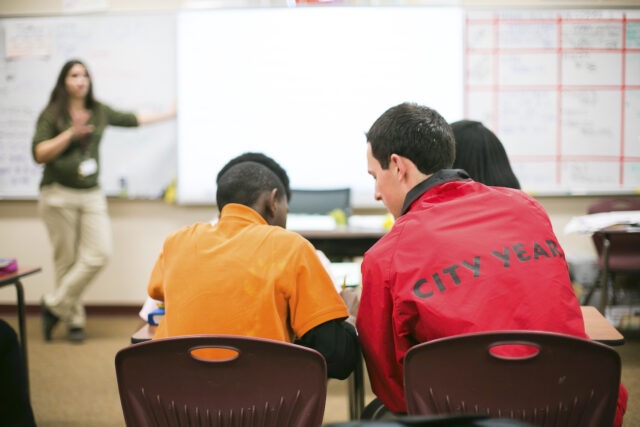Catching up and keeping up in the classroom
We’re here to break down and take a closer look at some of the terms and techniques our AmeriCorps members use as student success coaches, starting with “catching up” and “keeping up.”
What does “catching up” and “keeping up” mean?
“Catching up” refers to learning that focuses on key foundational skills that were taught or should have been covered in previous grades whereas “keeping up” refers to reinforcing current grade-level content.
For example, students typically start learning multiplication in the third grade. However, if a student struggles with basic addition, then the new concept of multiplication can be difficult to grasp. Educators help a student “catch up” by continuously building their skills in addition while “keeping up” with the class by helping the student see the connection between addition and multiplication.

How do you support a student catching up and keeping up at the same time?
In order to proceed to the next lesson or grade, students need to continually build their proficiency. Learning is on a continuum and all students, to some degree, require a combination of reviewing content alongside their current coursework to grow academically.
Tutoring and after school programs are two common ways that schools have supported students in catching up academically. Research shows that academic growth is most effective when students’ social and emotional needs are supported as well.
Student success coaches like City Year AmeriCorps members are able to further connect academics and social-emotional learning by building relationships with students. They not only reinforce feedback from teachers by coordinating what areas of support students need but are also able to further engage students in a small group or 1:1 setting.
Catching up and keeping up during the COVID-19 pandemic
What does academic development look like in the age of COVID? Educators are understandably trying to find new ways to re-engage students after a period of virtual learning and disrupted schedules.
The Nation’s Report Card recently released data that has shown that not only have test scores in math and literacy declined, but students’ confidence in both subjects have declined as well.
Supporting the mental health of students is integral for engagement and building their confidence as well. One way we can support students’ mental health is by creating a sense of belonging in school. When students receive caring and consistent support in school and are given space to have fun and express joy, they have a greater sense of belonging and community.
Small ways student success coaches can create community can include incorporating anime and manga in a literacy lesson, dancing to a TikTok during breaks and celebrating students’ achievements.
Social-emotional support is the key to helping students thrive and recover from disrupted learning caused by the COVID-19 pandemic.
City Year National Math Director Kristen Olmsted points out that when adults, such as City Year AmeriCorps members, leverage their relationships with students they can “[create] a more inclusive and collaborative learning space for all participants” and set a tone of “Let’s do this together.” Student learning must involve collaborating with them.
Learn more about City Year’s impact and what it means to be a student success coach.
Related stories
Because you'll be living on a stipend, it might be a good idea to hold off on that ottoman from...
Read more about Furnishing your apartment on a budget: Tips for AmeriCorps membersCity Year’s “Why We Matter” podcast explores the vital role of education and mentorship in empowering young people. Through interviews...
Read more about Why City Year’s student success coach network mattersRead more and check the City Year blog to learn the soft skills our corps members gain through a year...
Read more about Top five skills employers want you to have todayIf you speak with an alum of an historically Black college or university (HBCU) about their experience, you’ll quickly learn...
Read more about Serving with City Year sharpens job skills, HBCU graduate says















